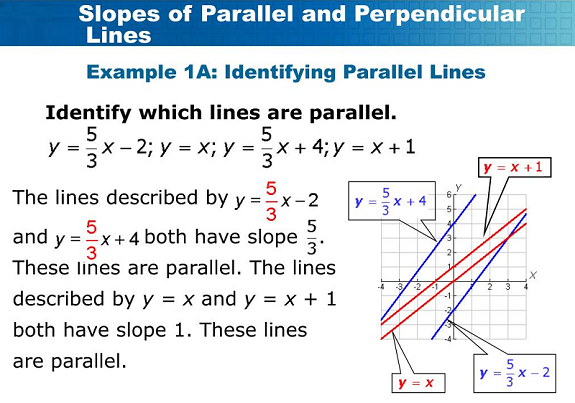Unit 3 Lesson 8 Slopes of Parallel and Perpendicular Lines
Unit 3 Lesson 8: Slopes of Parallel and Perpendicular Lines

Lesson Overview
Slopes of Parallel and Perpendicular Lines
What You Will Learn
- understanding how to use slopes to determine how two lines relate graphically
Overview
In this lesson, you will learn how to use slopes to determine how two lines relate graphically.
Essential Understanding
You can determine whether two lines are parallel or perpendicular by comparing their slopes. When two lines are parallel, their slopes are the same.
Read pages 142-149 in your course textbook.
This course is based on a textbook that is viewable by clicking on the textbook icon. Keep the textbook open while you go through the lesson so that you may refer to it throughout the lesson.
Additional Resources
Lesson 8: Slopes of Parallel and Perpendicular Lines
Proceed to the Next Page
Prepare for Application
Instructions
You have now studied the Slopes of Parallel and Perpendicular Lines. It is now time to demonstrate your learning.
Try the activities below on your own. You should be able to answer these before beginning the practice.
Create an extra journal called 'Unit 3: Lesson 8 activities' and do these in your journal.
Activity 1
Line l3 contains A(-13, 6) and B(-1, 2). Line l4 contains C(3, 6) and D(6, 7). Are l3 and l4 parallel? Explain.
Activity 2
What is an equation of the line parallel to y = -x - 7 that contains (-5, 3)?
Activity 3
Line l3 contains A(2, 7) and B(3, -1). Line l4 contains C(-2, 6) and D(8, 7). Are l3 and l4 perpendicular? Explain.
Activity 4
What is an equation of the line perpendicular to y=-3x-5 that contains (-3, 7)?
Activity 5
Refer to problem five on page 200 of your textbook.
Suppose a second player standing at (90, 40) misses the ball, turns around, and runs on a path parallel to the baseball's path. What is an equation of the line representing this player's path?




